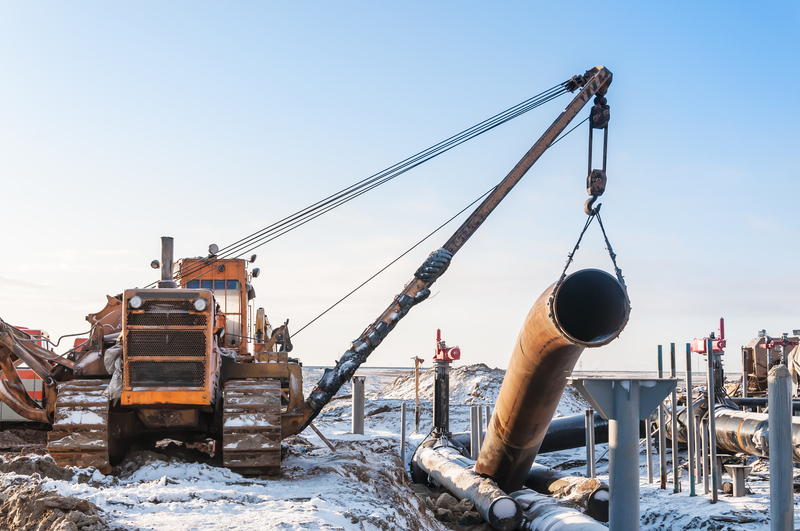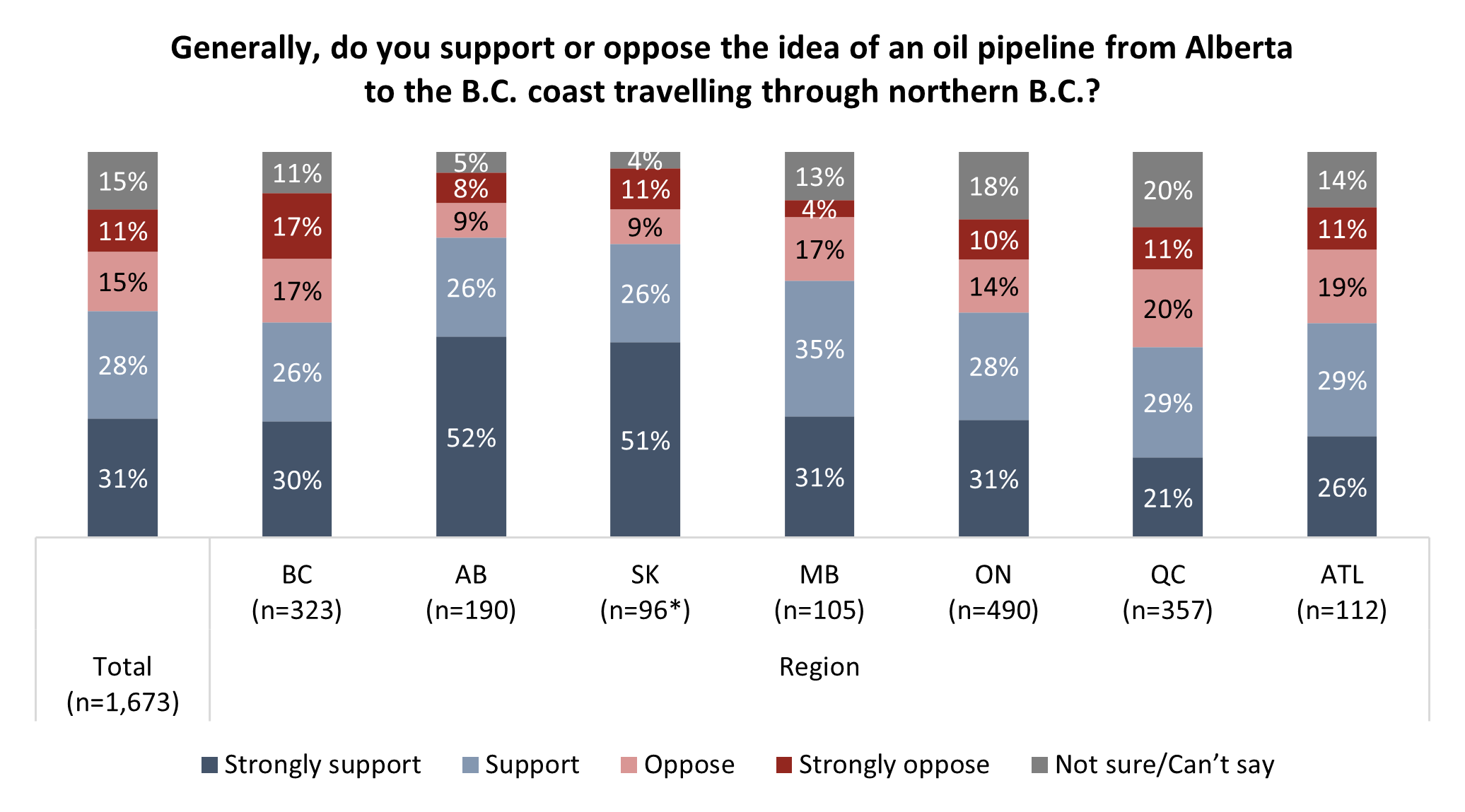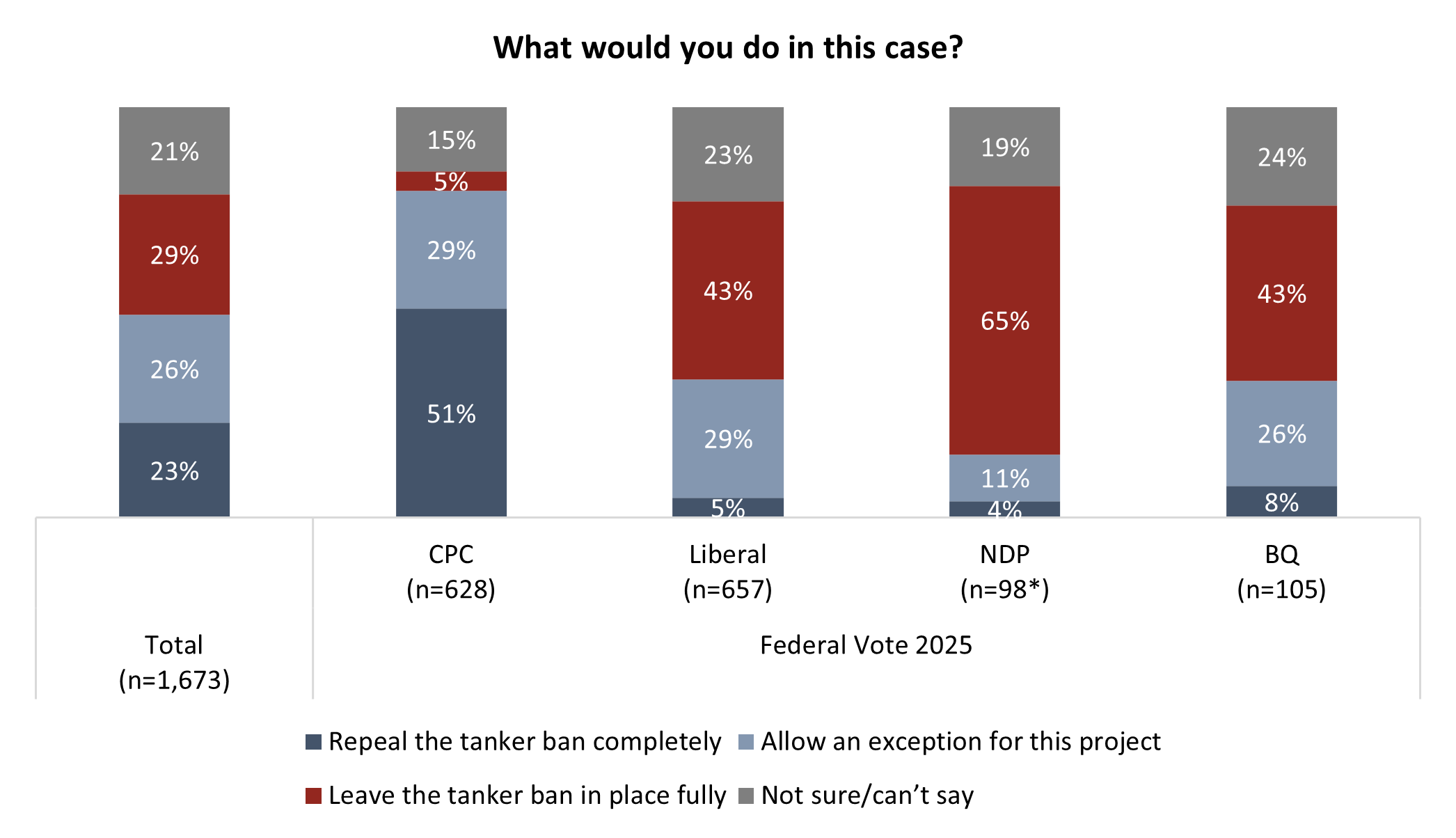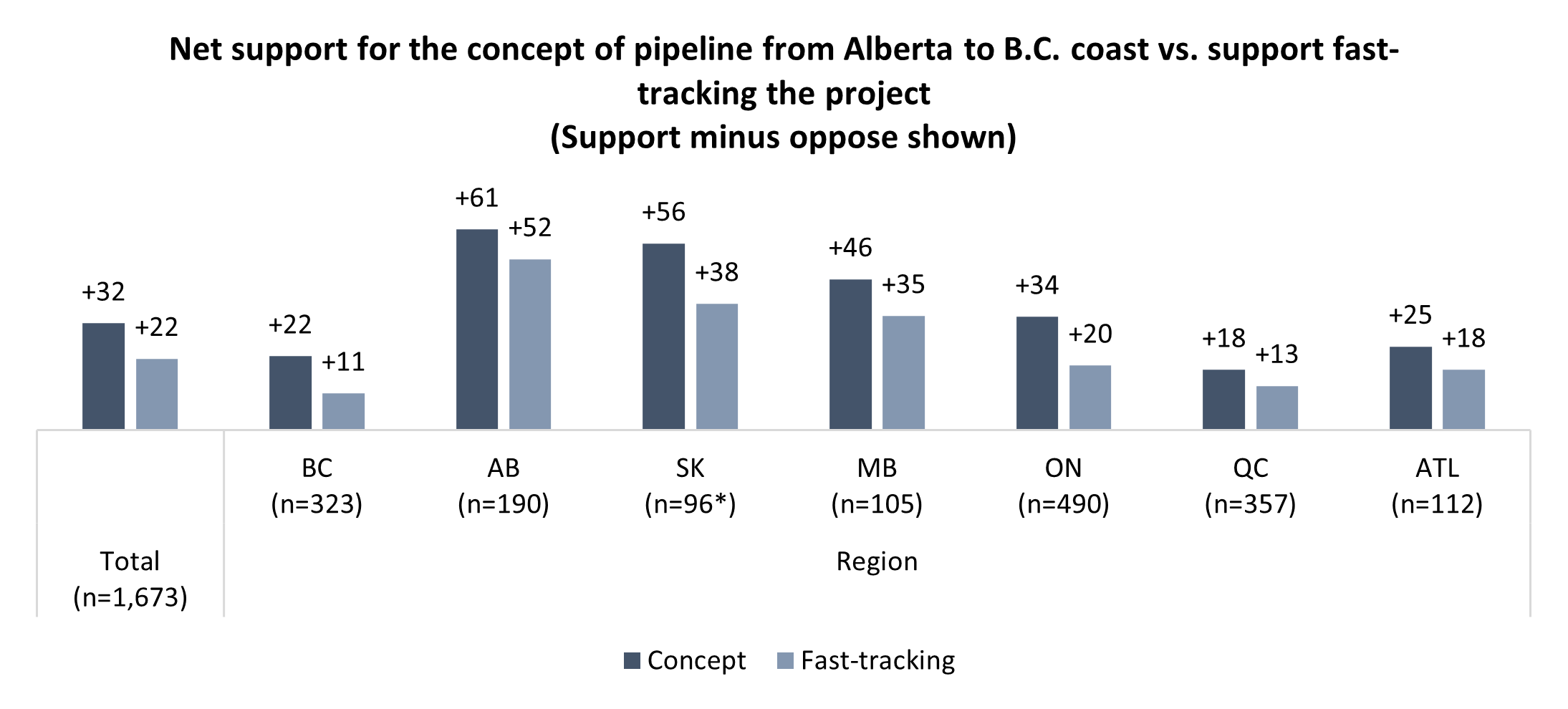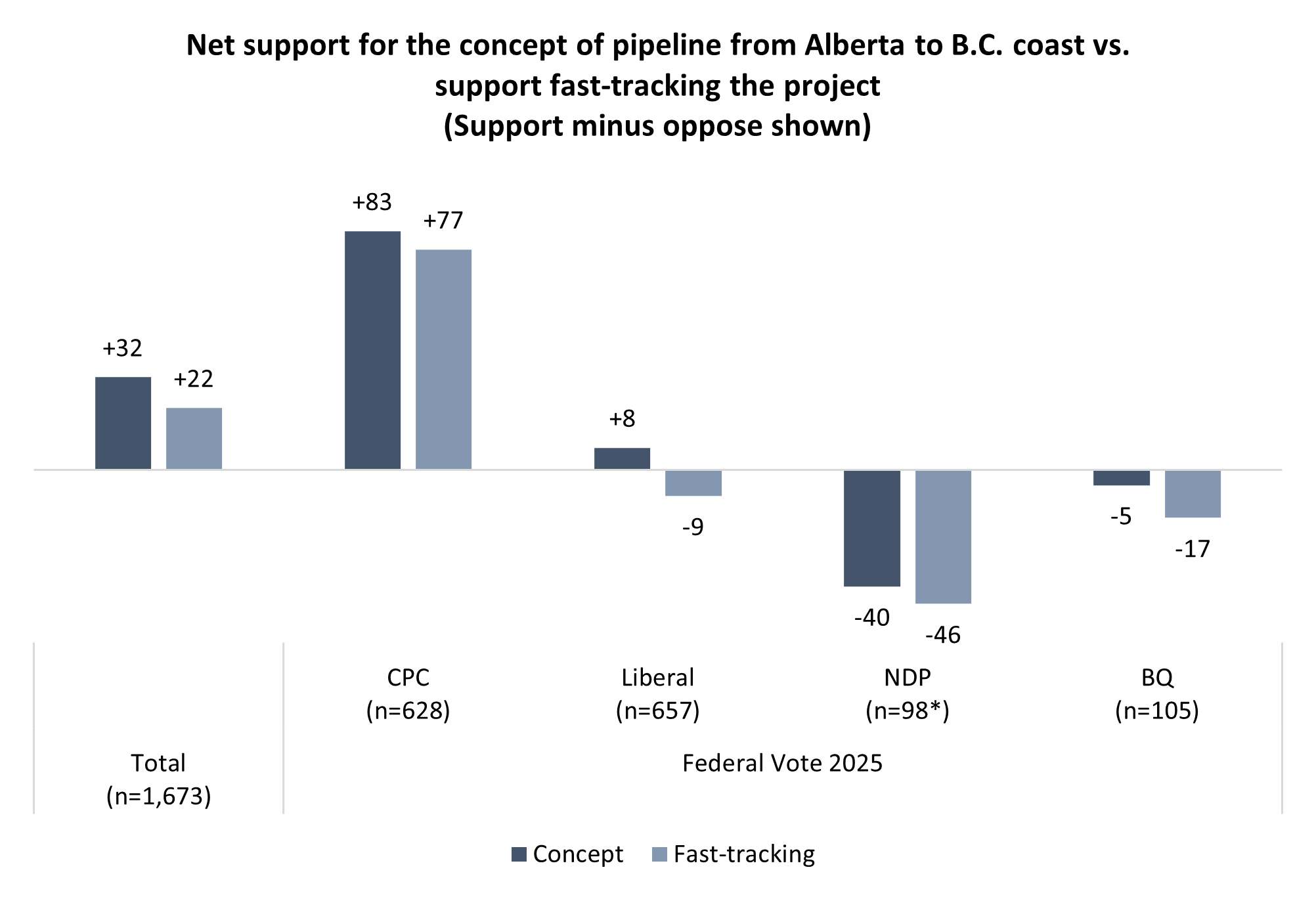Fewer say it should receive a “fast-track”, but support outpaces opposition from coast-to-coast
October 9, 2025 – A pipeline-related spat is playing out on social feeds in real time as B.C. Premier David Eby and Alberta Premier Danielle Smith send volleys back and forth about the value and risk of a pipeline from Alberta to the north coast of British Columbia. While no route has yet been suggested, the thought of project has been enough to rankle many on both sides of the debate.
New data from the non-profit Angus Reid Institute finds Canadians – including, importantly, B.C residents – largely on the same side in agreeing that a pipeline project has value and should be supported. That said, the devil may be in the details including how and if the project is fast-tracked.
On the pro side of the argument, a firm majority (59%) of Canadians, including majorities in every region, say they support the idea of a pipeline running from northern Alberta to the northwest B.C. coast. These data may challenge the stance of Eby, who has been steadfast that the project is, to this point, a pipe dream, without financial backing and counter to the law prohibiting tankers on the portion of the B.C. coast assumed to represent the terminus. In Eby’s province, support significantly outweighs opposition (56% to 33%).
That said, there are evidently also a plurality of Canadians (46%) and a majority of British Columbians (52%) who say B.C., or indeed any province on whose land a pipeline is built – should have veto rights unless its conditions are met. This sentiment is equally strong in Quebec (57%), and the inverse carries in Alberta (58% say the province should not be able to block a project) and Saskatchewan (56%).
As to the idea of this project being deemed in “the national interest”, here support wanes slightly. In nearly all groups, support for the project is higher than support for granting it a “fast-track” status by the federal government’s Major Projects Office, suggesting that the regulatory environment may continue to represent a challenge to construction.
Another of the biggest obstacles to construction is the tanker ban itself. Smith has suggested that this project should receive a “carve-out”, or that the ban itself should be lifted. A close to equal number of Canadians would lift the ban completely (23%), allow a carve-out for this project (26%), or keep the ban in place (29%). One-in-five are not sure (21%).
More Key Findings:
Among 2025 Liberal Party voters, a plurality support the idea of a pipeline from Alberta to the B.C. north coast (44% support, 36% oppose). The inverse is true, however, when asked about fast-tracking the project (39% support, 47% oppose)
In developing energy policy, Canadians would prioritize economic growth over environmental concerns, a key shift from prior years where the opposite was true. In 2016 and in 2021 when Angus Reid Institute asked, a majority said they prioritized the environment. Now 57 per cent prioritize the economy.
INDEX
Concept of Alberta to B.C. northern pipeline supported across the country
Pushback for fast-tracking among some
Provincial veto rights draw support unless conditions met
Tanker ban carve-out?
Shifting priorities from environment to economy
Concept of Alberta to B.C. northern pipeline supported across the country
Pipelines have once again become the topic du jour as U.S. President Donald Trump’s economic animosity towards Canada has shifted the national conversation towards economic development.
Related:
Canada’s expansion of Trans Mountain, a project taken across the finish line by the federal government, has been a boon for Alberta, leading towards a growth in oil production. But it’s expected that the expanded capacity brought by the Trans Mountain expansion will be filled by 2030. In order for Alberta’s oil output to continue growing, the province will need more pipes.
With that in mind, Alberta Premier Danielle Smith and the province are proposing a new pipeline that would take oil from the oil sands to the northern B.C. coast, emulating the long-cancelled Northern Gateway pipeline. That previous pipeline failed to launch after resistance in B.C. from both the provincial government and First Nations, and a federal law which banned tankers in the province’s northern coastal waters. Alberta’s new proposal faces similar obstacles.
Nearly a decade after the federal Liberal government under Prime Minister Justin Trudeau rejected Northern Gateway, a similar concept of a pipeline finds the support a majority of Canadians (59%) and a majority in every province in the country except Quebec, where half (50%) are in favour of such a pipeline:
*Smaller sample size, interpret with caution
Pushback for fast-tracking among some
Smith has suggested that her government will apply to the federal Major Projects Office to designate this project in the national interest. This would help to reduce the amount of time needed to build such a project through streamlining of regulatory and consultatory obligations. While this idea still receives majority support, there is a noteworthy loss of net support across the country for the concept of “fast-tracking” the hypothetical pipeline. This net support score represents the number of Canadians who support minus those who oppose each idea:
*Smaller sample size, interpret with caution
Among those who supported the Liberal Party in April, this fast-tracking appears to be a sticking point of sorts. Consider that the concept receives plurality support, with 44 per cent support and 36 per cent opposition (+8), while the reverse is true of the national interest designation (39 per cent support and 47 per cent opposition, -8). For other partisans, a similar trend is noted, with the net support level dropping across each. This suggests that the streamlined vision for the project may create more headaches than the current regulatory framework, or at the very least, that many Canadians need to be convinced of the merits and quality assurances of a faster production:
*Smaller sample size, interpret with caution
Provincial veto rights draw support unless conditions met
Much of the debate that is now bubbling centres on the idea that British Columbia does or does not have the right to block a project that goes through its territory. Prime Minister Mark Carney said that his government does not plan to force projects such as pipelines through provinces that object, despite having the constitutional authority to do so.
Canadians are divided but lean towards believing that provinces should be able to set conditions for approval of such projects like pipelines (46% vs. 39%). Majorities in Alberta (58%) and Saskatchewan (56%) are on the dissenting side, believing that provinces should not be able to block others’ export routes.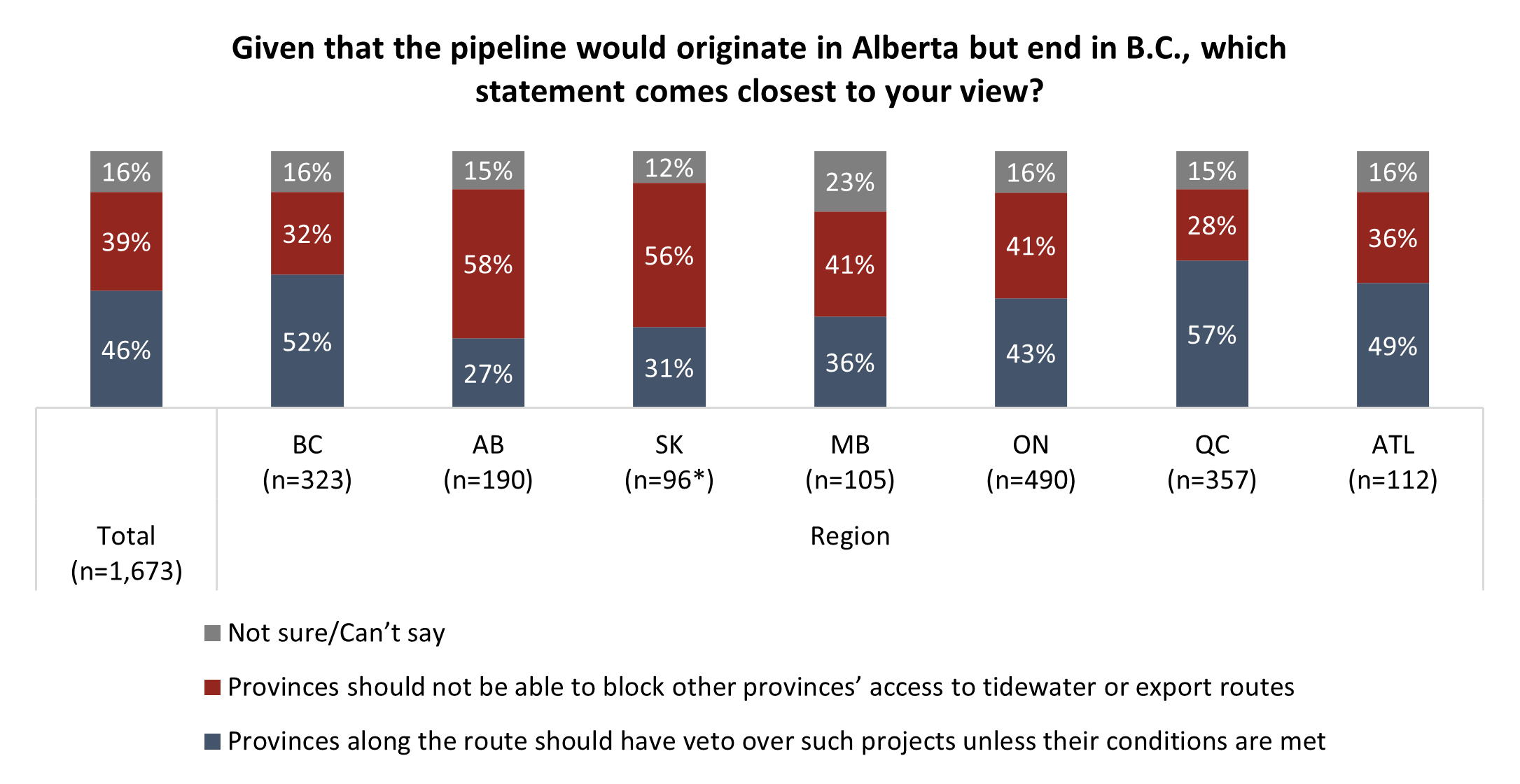 *Smaller sample size, interpret with caution
*Smaller sample size, interpret with caution
Views of this issue are evidently coloured by the political lens of the respondent. Two-thirds (67%) of past Conservative voters believe province should not have veto rights that prevent others’ access to tidewater. Most recent Liberal (60%), NDP (73%) and Bloc Québécois (65%) voters disagree:
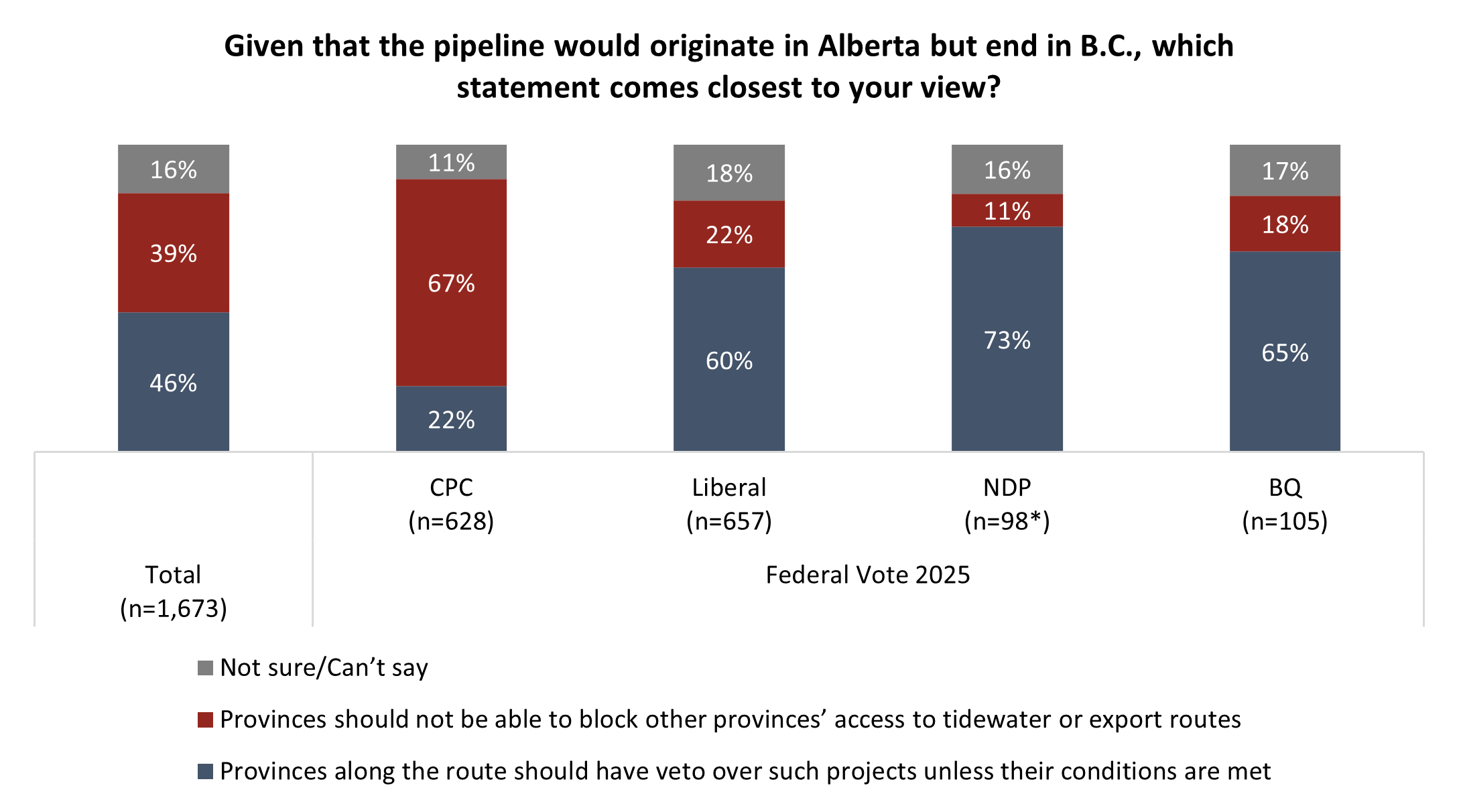 *Smaller sample size, interpret with caution
*Smaller sample size, interpret with caution
Tanker ban carve-out?
Besides potential objections in British Columbia, a pipeline terminating on the northern coast of British Columbia faces the barrier of federal legislation as well. The Oil Tanker Moratorium Act received royal assent in 2019 and prevents oil tankers of a certain size from stopping, loading, or unloading crude oil from the northern tip of Vancouver Island to the Alaskan border.
Half (49%) of Canadians either want the ban repealed (23%) or excepted for a northern B.C. pipeline project (26%). Taken together, this is a larger proportion than those who want to keep it in place (29%). Approaching two-in-five (37%) in B.C. support the ban, but more (44%) lean towards opening up the northern coast to tanker traffic either entirely (22%) or for this project (22%).
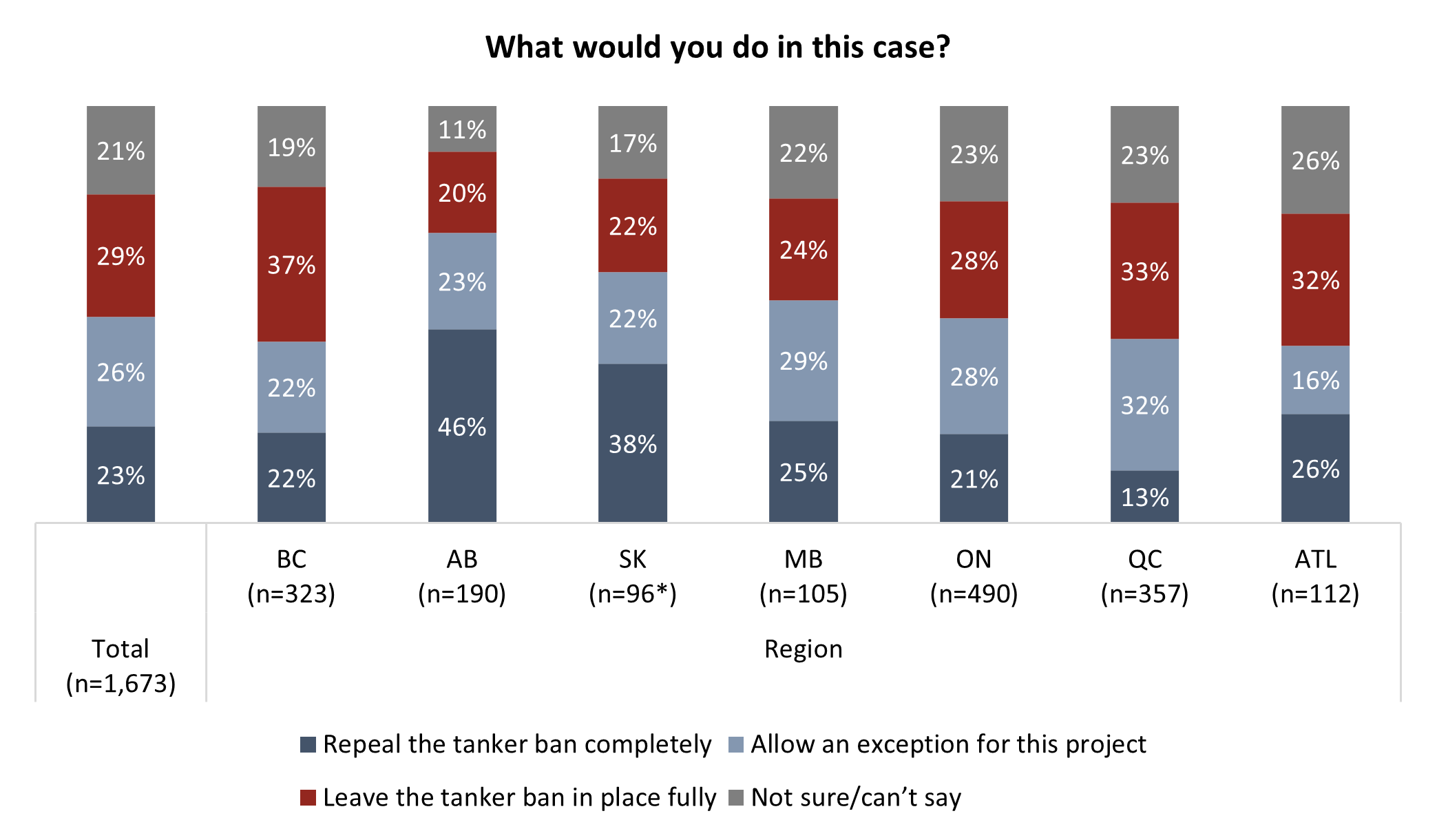 *Smaller sample size, interpret with caution
*Smaller sample size, interpret with caution
Repealing the ban is much more popular among recent Conservative voters (51%) than other groups of partisans. Past Liberal voters lean towards keeping the ban in place (43%) than either excepting it for a new northern B.C. pipeline (29%) or lifting it (5%):
*Smaller sample size, interpret with caution
Shifting priorities from environment to economy
Over the past decade, views of the eminence of the environment over the economy in these conversations has changed dramatically. Whether it’s economic anxiety or climate change pessimism, the proportion of those who prioritize one over the other has flipped from 2016 to 2025, as seen in the following graph: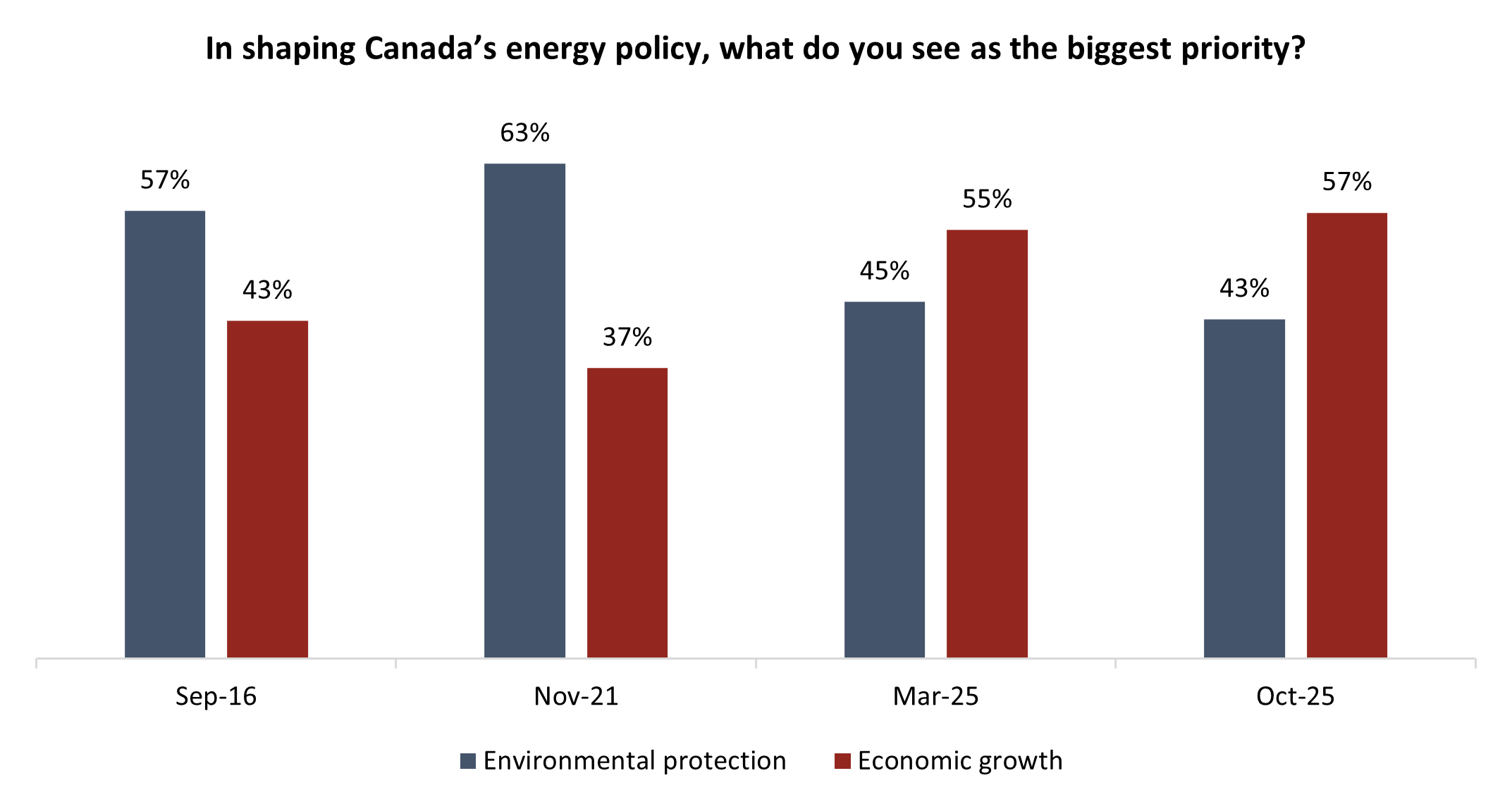
METHODOLOGY
The Angus Reid Institute conducted an online survey from Oct. 7-9 2025, among a randomized sample of 1,673 Canadian adults who are members of Angus Reid Forum. The sample was weighted to be representative of adults nationwide according to region, gender, age, household income, and education, based on the Canadian census. For comparison purposes only, a probability sample of this size would carry a margin of error of +/- 2 percentage points, 19 times out of 20. Discrepancies in or between totals are due to rounding. The survey was self-commissioned and paid for by ARI. Detailed tables are found at the end of this release.
For detailed results by age, gender, region, education, and other demographics, click here.
For PDF of full release, click here.
For questionnaire, click here.
MEDIA CONTACT:
Shachi Kurl, President: 604.908.1693 shachi.kurl@angusreid.org @shachikurl
Dave Korzinski, Research Director: 250.899.0821 dave.korzinski@angusreid.org
Jon Roe, Research Associate: 825.437.1147 jon.roe@angusreid.org

